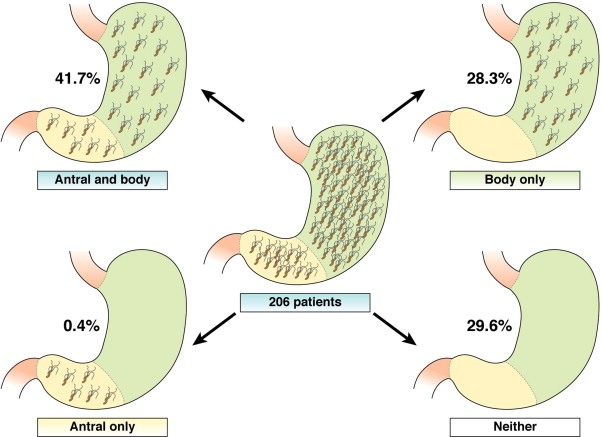What is H. pylori infection?
H. pylori (Helicobacter pylori) is a bacteria that can cause an infection in the stomach or duodenum (first part of the small intestine). It’s the most common cause of peptic ulcer disease. H. pylori can also inflame and irritate the stomach lining (gastritis). Untreated, long-term H. pylori infection can lead to stomach cancer (rarely).

What are the symptoms of H. pylori infection?
Symptoms and signs, if present, are those that arise from gastritis or peptic ulcer and include:
-
- Dull or burning pain in your stomach (more often a few hours after eating and at night). Pain lasts minutes to hours and may come and go over several days to weeks.
- Unplanned weight loss.
- Bloating.
- Nausea and vomiting (bloody vomit).
- Indigestion (dyspepsia).
- Burping.
- Loss of appetite.
- Dark stools (from blood in your stool).
How is H. pylori diagnosed?
If your healthcare provider suspects H. pylori bacteria may be the cause of a peptic ulcer, one or more of the following tests that may be ordered:
- A breath test: In this test, you or your child exhales into a bag before and after drinking a solution. The test measures the amount of carbon dioxide released in you or your child’s breath before and after drinking the solution. A higher level after drinking the solution means H. pylori is present.
- A stool test: This test looks for evidence of H. pylori in a stool sample.
- Upper endoscopy: A flexible tube is inserted down the throat into the stomach. A small tissue sample from the stomach or intestine lining is taken for testing for the presence of H. pylori.
How is H. pylori treated?
If you or your child don’t have symptoms, you don’t need to be treated. If you’ve been diagnosed with H. pylori, avoid taking nonsteroidal anti-inflammatory drugs. These drugs can increase your risk of developing an ulcer.
H. pylori-caused ulcers are treated with a combination of antibiotics and an acid-reducing proton pump inhibitor.
- Antibiotics: Usually two antibiotics are prescribed. Among the common choices are amoxicillin, clarithromycin (Biaxin®), metronidazole (Flagyl®) and tetracycline.
- Proton pump inhibitor: Commonly used proton pump inhibitors include lansoprazole (Prevacid®), omeprazole (Prilosec®), pantoprazole (Protonix®), rabeprazole (Aciphex®) or esomeprazole (Nexium®).
- Bismuth subsalicylate: Sometimes this drug (eg, Pepto-Bismol®) is added to the antibiotics plus proton pump inhibitor combinations mentioned above. This drug protects the stomach lining.

